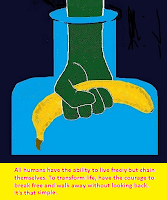Dhr. Seven, Amber Larson, CC Liu, Wisdom Quarterly; Vens. Nyanatiloka, Nyanaponika
 |
| "Monkey mind" is mental frenzy brought on by the Five Hindrances (patheos.com) |
 |
| Successful meditation is greatly hampered by monkey mind (Bliss Blog/Beliefnet.com) |
 |
| Shut up, shut up, shut up (childhoodrelived.com) |
But when we sit in an attempt to meditate, then it becomes crystal clear: This mind is no sane, serene human mind. It is like a wild monkey!
 |
| If we were to be with what is...monkey mind? |
However, what is the cause, what is at the root of all this monkeying around in distraction, frustration, desperation with the doors of the senses unguarded? There are five causes that hinder and obstruct the heart/mind preventing serenity and insight:
- sense desire (craving for sensuality)
- aversion (anger, annoyance, fear)
- sloth and torpor (boredom and sleepiness)
- restlessness and remorse (flurry and worry)
- skeptical doubt (uncertainty and wavering).
 |
| Hear no Kardashian, see no Kardashian, speak no Kardashian (not even Kendall and Kylie) |
Solutions
 |
| Let go. Monkey mind is a monkey trap |
This can be accomplished by focusing on the harm done when they are allowed to hinder the heart/mind. Then there is a natural withdrawal. One becomes dispassionate, lets go, and no longer takes an interest in these obsessions. However, this release is only temporary, possibly lasting the entire meditation period.
Not all "meditation" is a sitting session, even if that tends to be the most intensive period of practice, of walking the path the Buddha pointed out as the way to ultimate freedom.
The overcoming of these Five Hindrances by the meditative absorptions (jhanas) is a way of temporarily suspending them. Such an achievement will make one seem and feel very "saintly" (and, indeed, this is how most of the world's religions define sainthood as it sometimes entails miraculous powers). For purified in heart, mentally clear and at peace, one's conduct is full of effortless restraint. But this is called "overcoming through repression" (vikkhambhana-pahāna).
These obstructive hindrances disappear forever only when we enter the noble or supermundane paths (and become nobly enlightened individuals. Skeptical doubt (misgivings about whether this is the path to enlightenment) vanishes when we reach stream entry. Craving sense desires, aversion, and worry vanish on reaching non-returning. Sloth, torpor, and restlessness vanish when we become arhats.
- More info about their origination and how to overcome them: AN I, 2; VI, 21; SN XLVI, 51
Ven. Nyanaponika (BPS.lk, Wheel #26) edited by Wisdom Quarterly
"Without having overcome these five, it is
impossible for a meditator, whose insight thus lacks strength and power, to
know one's own true good, the good of others, or the good of both. Nor
will a person be capable of realizing that superhuman state of distinctive
achievement, the knowledge and vision enabling the attainment of full enlightenment.
"But if one has overcome these five hindrances and impediments,
these overgrowths of the mind/heart that stultify insight -- then it is possible
that, with strong insight, a meditator can know one's own true good, the good
of others, and the good of both. And one will be capable of realizing
that superhuman state of distinctive achievement, the knowledge and
vision enabling the attainment of full enlightenment (AN 5:51).
"One whose heart is overwhelmed by unrestrained covetousness will do
what one ought not do and neglect what one ought to do.
"And through that, one's good name and one's happiness will come to ruin.
"One whose heart is [further] overwhelmed by aversion... sloth and torpor... restlessness and remorse... skeptical doubt will do what one ought not do and neglect what one ought to do. And through that, one's good name and one's happiness will come to ruin.
"And through that, one's good name and one's happiness will come to ruin.
"One whose heart is [further] overwhelmed by aversion... sloth and torpor... restlessness and remorse... skeptical doubt will do what one ought not do and neglect what one ought to do. And through that, one's good name and one's happiness will come to ruin.
"But if a noble disciple has seen these FIVE as defilements of the
heart/mind, one will give them up. And by doing so, one is regarded as one of great wisdom, of abundant insight, clear-seeing, well endowed with wisdom.
This is called "endowment with wisdom" (AN 4:61). More

No comments:
Post a Comment